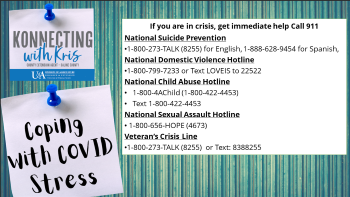Coping with COVID Stress
Contact
Kris Boulton
Phone: (501) 303-5672
Email: kboulton@uada.edu

University of Arkansas System Division of Agriculture
Cooperative Extension Service
1605 Edison Ave.
Benton, AR 72015

Konnecting with Kris Blog
Connect with Saline County FCS agent Kris Boulton.
Coping with COVID Stress
The COVID-19 pandemic has had a major effect on our lives. Many of us are facing challenges that can be stressful, overwhelming, and cause strong emotions in adults and children. Public health actions, such as social or physical distancing and wearing a mask are necessary to help reduce the spread of COVID-19, but they can make us feel isolated and lonely and can increase stress and anxiety.
Learning to cope with stress in a healthy way will make you, the people you care about and those around you become more resilient during any crisis.
Stress can cause the following:
- Feelings of fear, anger, sadness, worry, numbness, or frustration
- Changes in appetite, energy, desires, and interests
- Difficulty concentrating and making decisions
- Difficulty sleeping or nightmares
- Physical reactions, such as headaches, body pains, stomach problems, and skin rashes
- Worsening of chronic health problems
- Worsening of mental health conditions
- Increased use of tobacco, alcohol, and other substances
It is natural to feel stress, anxiety, grief, and worry during the COVID-19 pandemic. Here are five tips that can help you, others, and our communities manage stress.
Tip 1 Take breaks from watching, reading, or listening to news stories
Including those on social media. It’s good to be informed but hearing about the pandemic constantly can be upsetting. Consider limiting news to just a couple times a day and disconnecting from phone, tv, and computer screens for a while.
Tip 2 Take care of your body
Including taking deep breaths and stretching, eating healthy well-balanced meals, avoid excessive alcohol, tobacco, and substance use. It’s important to continue with routine preventive measures (such as vaccinations, cancer screenings, annual health check up) as recommended by your healthcare provider.
Tip 3 Make time to unwind
Try to do some activities you enjoy. This can be prayer, meditation, reading a book or crafts.
Tip 4 Connect with others
Talk with people you trust about your concerns and how you are feeling. Think about people in your family that may not have connections with others. You can call on the phone or video chats. This can help you and your loved ones feel less lonely or isolated.
Tip 5 Connect with your community or faith-based group
While social distancing measures are in place, try connecting online, through social media, by phone or mail. Find a something that is a need you can do safely. Remember it is beneficial to think of others instead of always focusing on yourself.
Bonus Tip
Remember to take care of yourself. When you are less stressed you are better equipped to take care of yourself and help others cope with stress.
-
If you are in crisis, get immediate help Call 911
- If you are struggling to cope, there are many ways to get help. Call your healthcare provider if stress gets in the way of your daily activities for several days in a row.
For more information: Life Skills and Wellness
For more information about managing stress
During times of extreme stress, people may have thoughts or actions that are not usual. I’ll share some helplines that you or love ones might need.
